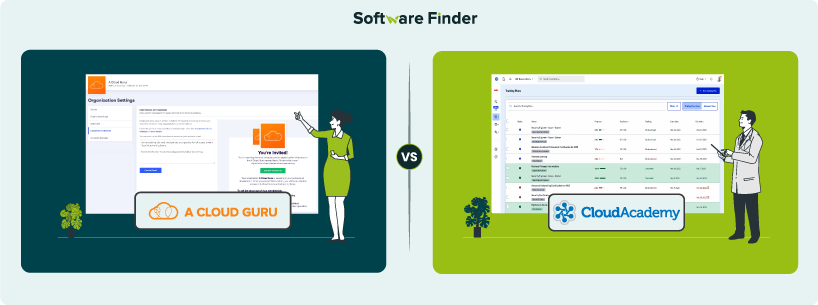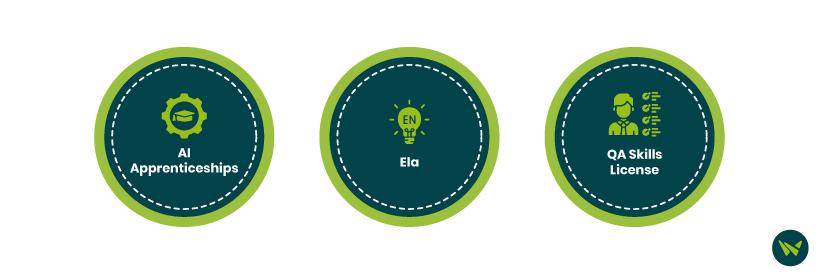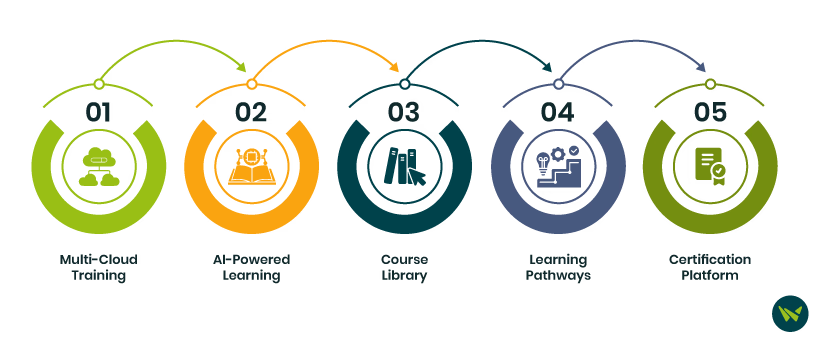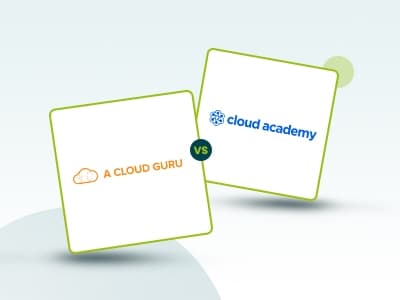
Training teams has never been more challenging, especially with the rapidly evolving needs of modern businesses. That’s why organizations need flexible Learning Management Systems (LMS) that support continuous learning and help achieve long-term goals.
A Cloud Guru and Cloud Academy assist their users in building critical cloud skills. Both offer structured learning paths, certification support, and tools to boost employee engagement.
The tech landscape, surely, is constantly evolving, but so are these two modern learning platforms. Let’s delve into their features further and discover which one might suit you better.
Feature | A Cloud Guru | Cloud Academy |
Multi-Cloud Training | Multi-cloud initiatives across AWS, Azure, and Google Cloud, over 1,800 cloud labs | Real cloud scenarios across AWS, Microsoft Azure, Google Cloud, DevOps, and more |
AI-Powered Learning | AI skills and resources, Iris AI, AI Engineer | GenAI, Machine Learning (ML), AI apprenticeships, partnership with co-pilot |
Course Library | Thousands of expert-led courses | Pre-built courses across various fields, including AI, digital marketing, and security |
Learning Pathways | Structured Learning Paths that blend courses, labs, and assessments | Hands-on, instructor-led learning, AI-powered learning assistant (Ela) |
Certification Platform | Certification Prep Centre | Professional certificates offered by recognized organizations |
Pricing | Starting from $15 per month | Starts from $28 per month |
A Cloud Guru, now part of Pluralsight, is a cloud-based LMS that supports a wide range of users in their managerial, logistical, and learning tasks. Whether it's delivering targeted training through its hands-on cloud labs or ensuring precision with Iris AI, the platform covers every aspect of modern tech education. The convergence of A Cloud Guru’s cloud-focused learning features with Pluralsight’s extensive course library and skill assessments has solidified its reputation as a comprehensive LMS. The platform is now particularly suited and recommended for teams aiming for deep technical upskilling and mastery in cloud infrastructure.
Unique Features Of A Cloud Guru
- Hands-On Labs: Offers 3,000+ interactive labs where learners can easily practice new skills in real cloud environments, without any prior setup
- AI Engineer: Learners gain experience building, deploying, and improving AI models for real-world use. It allows them to work with production-ready code and maintain smooth operations
- Skill Assessment Engine: Delivers profound skill assessments and tracks progress over time, helping organizations identify gaps and personalize learning paths for each team member
Pros And Cons Of A Cloud Guru
Pros
- Hands-on labs provide opportunities to explore and trial new cloud-based solutions
- User-friendly platform with intuitive navigation and clean interface
- Wide variety of courses across multiple cloud platforms
Cons
- Content is not regularly updated, or gamified - leading to less engagement
- Mobile app performance needs improvement, as it occasionally gets stuck
Cloud Academy, now part of QA Training, is a cloud-based LMS. The platform allows you to enhance your team’s technical capabilities with comprehensive training in AI, cloud computing, and data management. It is equipped with intuitive and conducive features such as interactive labs and adaptive learning paths. Cloud Academy not only tracks progress over time but also identifies skill gaps to guide learning. The LMS is designed for enterprises, tech teams, and professionals across industries.
Unique Features Of Cloud Academy

- AI Apprenticeships: Offers AI apprenticeships from Levels 3 to 7, helping organizations develop flexible, AI-powered talent and skills that can transform business capabilities
- Ela: An AI-powered learning assistant that delivers expert guidance across courses and labs, helping learners progress faster with 24/7 intelligent support
- QA Skills License: Provides cost-effective access to a wide range of training with flexible scheduling, helping businesses manage continuous learning under a single license
Pros And Cons Of Cloud Academy
Pros
- High-quality learning material with clear explanations
- The platform is optimized and well-designed, with an intuitive mobile app
- Offline mode allows downloading courses for flexible learning
Cons
- Sometimes the courses can take a long time to load
- User interface could be more visually engaging


A Cloud Guru (now part of Pluralsight) offers flexible pricing plans for individuals, businesses, and the public sector.
For individuals, Pluralsight provides a free 10-day trial and five subscription options:
- Core Tech – $15/month
- AI+, Cloud+, Data+, and Security+ Plans – Starting at $18/month
- Complete Plan – $28/month
For organizations, Pluralsight offers three business and public sector plans with distinct features. These are billed annually, starting at $399/user/year.
In comparison, Cloud Academy (now known as QA Training) features a simpler pricing structure with three main plans and optional add-ons:
- Individual Plan – $28/month, ideal for individual learners
- Small Team – $36/user/month, recommended for teams of up to 15 members
- Enterprise – Custom pricing, suited for large organizations
A Cloud Guru is a smart pick for tech-driven teams and enterprises focused on building deep cloud expertise. Backed by Pluralsight, it combines hands-on labs, skill assessments, and certification prep to support structured, goal-based learning. It’s especially well-suited for industries like IT, finance, and consulting, where cloud fluency and multi-cloud management are key priorities.
Cloud Academy, on the other hand, is best suited for organizations seeking flexible cloud training across a wide range of technologies and skill levels. With interactive labs, learning paths, and extensive content on cloud, DevOps, security, and AI, it fits well in tech, public sector, and enterprise environments focused on continuous upskilling and practical, real-world learning.
Ultimately, the choice depends on the type of team training your organization needs. Both platforms offer a comparable range of features. If you’re still unsure, feel free to contact us for prompt expert advice to help guide your decision.
